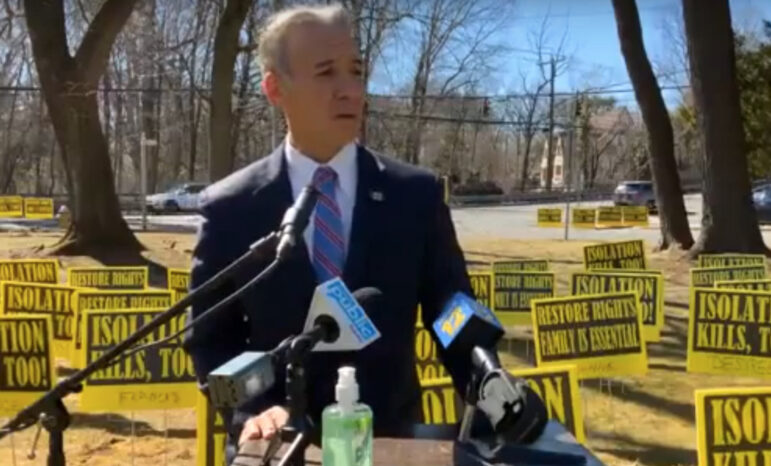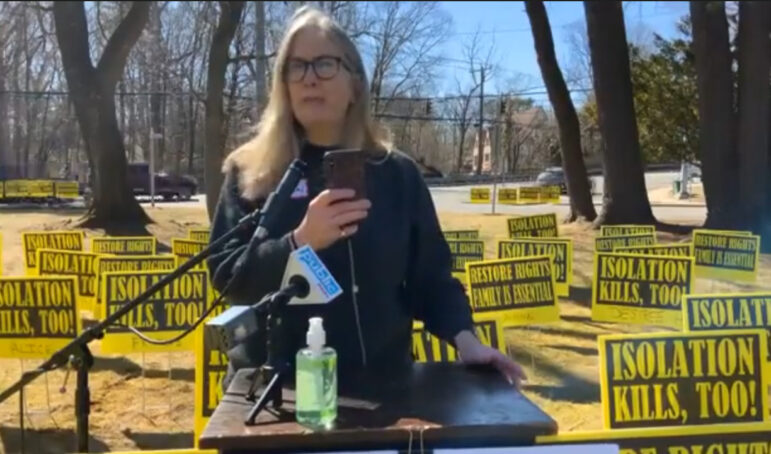A rally was held at Greenwich resident Jenny Larkin’s house on the corner of Hillside Rd and East Putnam Ave on Monday to raise awareness for a resounding call for the end of isolation of residents in long term care facilities.
The group “Isolation Kills” has a chapter in every state, and Monday’s rally kicked off a series of events across the state, as part of a multi-state campaign to draw attention the treatment of residents in long term care facilities.
Sheilah Smith, who along with Amy Badini, co chairs the Family Council at Nathaniel Witherell, the town-owned 202 bed nursing home, said Monday marked the one year anniversary of the lockdown and lockout in long term care facilities in Greenwich and across the country.
“We call it a Banniversary,” Smith said. “All visitors, including family members, have been banned from visiting their loved ones in long term care facilities.”
She said after a year of isolation and starvation of contact, it was time to start a conversation about ending the ban.
The group noted that while 17 states have some type of Essential Caregiver program, Connecticut does not.

“I implore healthcare workers in long term care facilities across the state and country to please, please get vaccinated,” Smith said. “There are many healthcare workers who are refusing the vaccine and this just prolongs the isolation, contact starvation and lockdown.”
First Selectman Fred Camillo said everyone could agree that isolation was as bad as the Covid-19 virus.
“We all know people who have died alone, which should never happen,” he said. “But now there is a vaccine.”
While Camillo said he was pleased that Nathaniel Witherell had amended their visitation policy, but it was also important to encourage people to get vaccinated.
“Policies can be adjusted and will,” Camillo said. “Better days are ahead.”
Liz Stern, whose mother died in a Connecticut nursing home on Nov 3, said Monday was the day to start to say, “Enough.”
She said before the pandemic, essential caregivers had been able to be by their loved one’s side every day.
“We made their home as homelike as it could possibly be,” she said. “Nobody has a nursing home or long term care facility in their retirement plan.”
Ms Stern said that while staff had stepped up ,”No nurse can replace a daughter. No nurse can replace a spouse. No nurse can replace a brother or sister who sat by your side.”
“We’ve written thousands of letters, given scores of interviews, talked to the media, worked with our ombudsman, but still that does not seem to be enough.”
Liz Stern, whose mother lived in a nursing home
Stern said that while guidance from CMS (Centers for Medicare & Medicaid Services) was upgraded on September 17 to allow for some visitation, it was not enough.
“And we need facilitators to listen and regulators to regulate,” Stern said.
Stern referred to the the Nursing Home Bill of Rights, a law in place since 1987, that has been waived for a year.
“What happened to the right to a dignified existence?” she asked. “What happened to the right of access to visitors of one’s choosing at any time?…We’re here to ask all who have stood outside of closed windows of their loved ones this past year to hold onto the energy that has been stirred.”
Mairead Painter the state’s Long Term Care Ombudsman said her job was to protect the rights of residents.
“On March 13, it will have been a year since the doors at nursing homes across the country were closed due to guidance at a federal level,” Painter said. “This guidance came out of CMS, and at almost all times, within their rooms. It meant that family members, friends and individuals that normally provided daily support to residents were no longer able to access the homes.”
“We protect their rights to autonomy, choice and most of all, appropriate care,” she said. “For decades we’ve been working to move away from a model that was just a medical model, to a model of person-centered care in all long term care communities.”

Jenny Larkin shared a moving story about her mother who had resided at Nathaniel Witherell until she died in February.
“My mom, Nola Modine Larkin, was healthy, beautiful and happy the last time we saw her at the Nathaniel Witherell, her home, one year ago today,” Larkin recalled, describing her mother as a bright, funny, computer literate senior, who had previously lived with her for 12 years, independently, until a stroke disabled her right arm and leg.
“After rehab at Nathaniel Witherell, she chose to stay there because she felt it would be better for everyone. Another stroke took away her speech later that year, but her career as a Broadway actress enabled her to communicate and entertain with facial expressions and body movements.”
Larkin described her mother as being blessed to have staff and caregivers who genuinely loved her and cared for her.
“Then, she met the love of her life, George,” she recalled, adding that her mother was so happy, people would ask her if she and her mother were sisters.
“Then came the Covid-19 lock down and drastic measures to save lives. No more visits,” she said. “So I relied on information from social workers and other staff because mom was not able to communicate by phone.”
Larkin said she believed her mother was being well cared for and was safe from Covid.
She said she joined the Witherell’s Family Council and created a fundraiser to provide lunches for staff and PPE.
“We’re all in this together,” she said.
She said 40 minute Zoom calls with family were better than nothing.
“Then, in July, I saw her roommate’s obituary in the newspaper and noticed she had died a month earlier. I first realized I had no idea what my mom was going through inside.”
Larkin asked about the roommate and about George, but was told privacy laws prevented staff from sharing that information.
“At her quarterly care meeting I learned she had lost 25 lbs,” Larkin continued.
She said when outdoor visits were introduced she was thrilled to see her mother in person, first from her car in the parking lot and then in the Rose garden, where she visited with her daughter and new grand daughter.
However, she said that each time a staff member was exposed to Covid, family visits were suspended.
She said the in person visits filled up so quickly on the first-come first, first-served digital calendar, and that sometimes it was three weeks between visits.
Growing more concerned about her mother’s mental health, Larkin asked if she could hire her mother’s current staff caregiver for extra hours, but learned the nursing director had just ended that policy due to insurance concerns.
“I could hire a stranger, but I don’t think that’s what my mom needed,” she continued.
With the colder weather, visits at the Witherell moved into the Pods outside with masks and stricter rules due to the confined space.
Only two people were allowed to visit. Larkin went alone to visit her mother.
“When I visited the Pod, her family Zoom meeting was canceled. It was one or the other, but not both,” she said. “I tried to use Facetime or Zoom to include them when I visited them in person, but there is no Wifi in the pods.”
Larkin started recording her visits.
“We noticed she was starting to have really bad days. I noticed her glasses were missing and she lost a tooth. At mom’s last care meeting I learned the antidepressants she had been given weren’t working and they asked if we should raise her dose, but I read that anti-depressants are for clinical depression, not for for seniors suffering for failure to thrive due to loneliness and isolation. I insisted she was unhappy due to the isolation and not being able to see her family and George.”
“I was told it’s not part of isolation, but a natural part of aging,” Larkin continued.
When she learned her mother could move to the second floor to be closer to George, she was happy to see photos of their reunion.
Unfortunately, she was told by a social worker they might have to return her mother to the first floor.
“It seems that seeing George and not being able to touch him or take her mask off made her more uncomfortable and upset. At least my mom had received both doses of the vaccine and wasn’t going to die of Covid. I just had to hold out.”
Her last in person visit with her mother was in an outdoor Pod on Thursday, Feb 4 and she said her mother looked horrible.
“She wasn’t able to sit up. Her lower eyelids were sagging and red. She seemed to pass out and then come to and then violently motion to the door. ‘Out! Out!’ I asked if she wanted me to get her out of her and she nodded, ‘Yes.'”
Upset, Larkin said she’d work over the weekend to do everything she could to get her mother out, or arrange visits.
“You just have to make it through the weekend,” Larkin recalled telling her mother. “But Monday she died.”
After Larkin shared her story, Ms Smith said, simply, “We need to let family back in.”